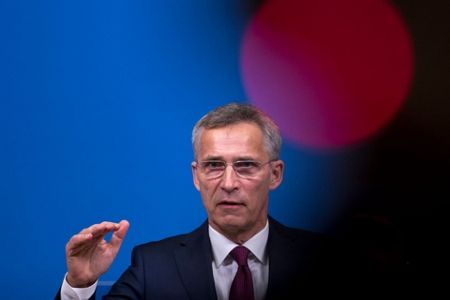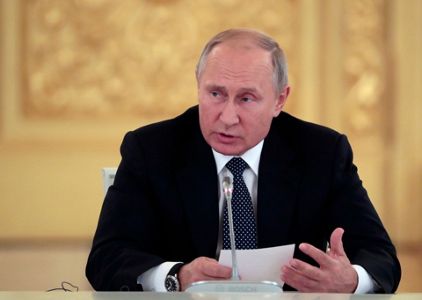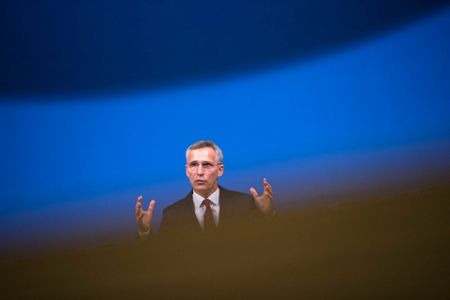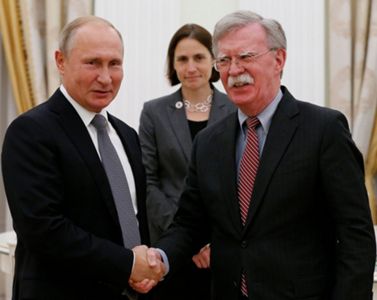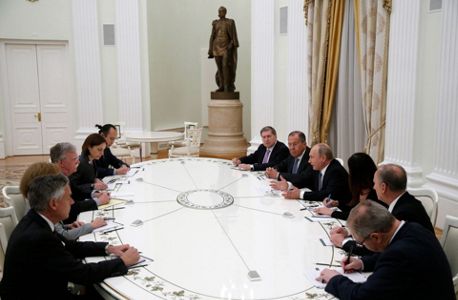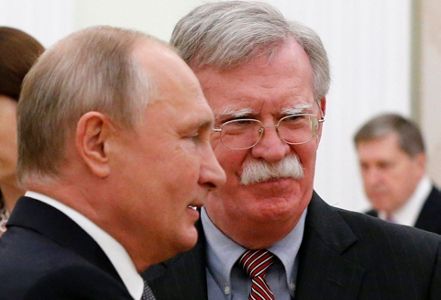BRUSSELS (AP) — NATO Secretary-General Jens Stoltenberg said Wednesday that allies blame Russia for violating an important Cold War-era missile treaty but he does not expect them to deploy more nuclear warheads in Europe in response.
In Moscow, Russian President Vladimir Putin followed up on U.S. President Donald Trump's declared intention to pull out of the 1987 arms control pact by warning that if the U.S. deploys the now-banned missiles in Europe, Russia would target the nations hosting them.
The European Union has described the Intermediate-Range Nuclear Forces (INF) Treaty as a cornerstone of European security and urged Russia and the United States to uphold it. But Stoltenberg did not encourage the U.S., the biggest and most influential member of NATO, to stay in the treaty.
"I don't foresee that allies will deploy more nuclear weapons in Europe as a response to the new Russian missile," Stoltenberg told reporters at NATO headquarters in Brussels. However, he noted that the 29 allies were assessing "the implications of the new Russian missile for our security."
Putin said he hoped the United States did not plan to put the kind of missiles the treaty banned in Europe, if it does withdraw from the pact.
"If they are deployed in Europe, we will naturally have to respond in kind," Putin said at a news conference after talks with visiting Italian Prime Minister Giuseppe Conte. "The European nations that would agree to that should understand that they would expose their territory to the threat of a possible retaliatory strike."
The Russian leader strongly rejected U.S. and NATO allegations that Moscow has violated the treaty. He charged it was the U.S. that violated pact with missile defense facilities in Romania that could be used to hold cruise missiles in violation of the INF.
With tensions over the treaty's possible unraveling mounting, NATO on Thursday officially launches its Trident Juncture war games in Norway, its biggest maneuvers since the Cold War.
Russia, which shares a border with Norway, has been briefed by NATO on the exercises and invited to monitor them, but the move has still angered Moscow. Russia's defense minister warned that Moscow could be forced to respond to increased NATO military activities near its western border.
"NATO's military activities near our borders have reached the highest level since the Cold War times," Russian Defense Minister Sergei Shoigu said, noting that the war games will be "simulating offensive military action."
Speaking on a trip to Belarus, Shoigu also warned that Poland's plan to permanently host a U.S. army division would affect regional stability and trigger a Russian response. He said Moscow would have to "take retaliatory measures to neutralize possible military threats."
The NATO maneuvers in Norway will involve around 50,000 personnel, 65 ships, 250 aircraft and 10,000 vehicles in a hypothetical scenario that involves restoring Norway's sovereignty after an attack by a "fictitious aggressor."
The United States insists that a new Russian missile system — known as the 9M729 — contravenes the 1987 INF treaty. NATO allies agree that is probably the case. The pact between Moscow and Washington bans an entire class of weapons — all land-based cruise and ballistic missiles with a range from 500-5,500 kilometers (310-3,410 miles.)
Experts say the Russian system would operate at lower altitudes, making it tough to detect and bring down. It could also reach targets across Europe and even the U.S. west coast if stationed in Siberia.
Stoltenberg said he was concerned about the weapons, but did not expect a repeat of the so-called "Euromissiles crisis" in the 1980s. Back then, the United States deployed cruise missiles in Europe to counterbalance a perceived threat from Russia's SS-20 nuclear warheads.
"The INF is a landmark treaty, but the problem is that no treaty can be effective, can work, if it's only respected by one" side, Stoltenberg said, adding that the "U.S. is in full compliance."
He said, based on U.S. intelligence and Russia's reluctance to discuss the missile system with NATO, "the most plausible explanation is that Russia is in violation of the treaty."
Asked whether he thought the United States should stick with it, Stoltenberg said: "The challenge, the problem, is the Russian behavior which we have seen over many years."
In Berlin, Germany's foreign minister urged his Russian counterpart to do everything possible to preserve the treaty. The German Foreign Ministry said Heiko Maas told Russia's Sergey Lavrov on Wednesday that includes clearing up the allegations that Moscow has violated the pact.
___
Vladimir Isachenkov in Moscow and Geir Moulson in Berlin contributed to this report.
Copyright 2018 The Associated Press. All rights reserved. This material may not be published, broadcast, rewritten or redistributed.





